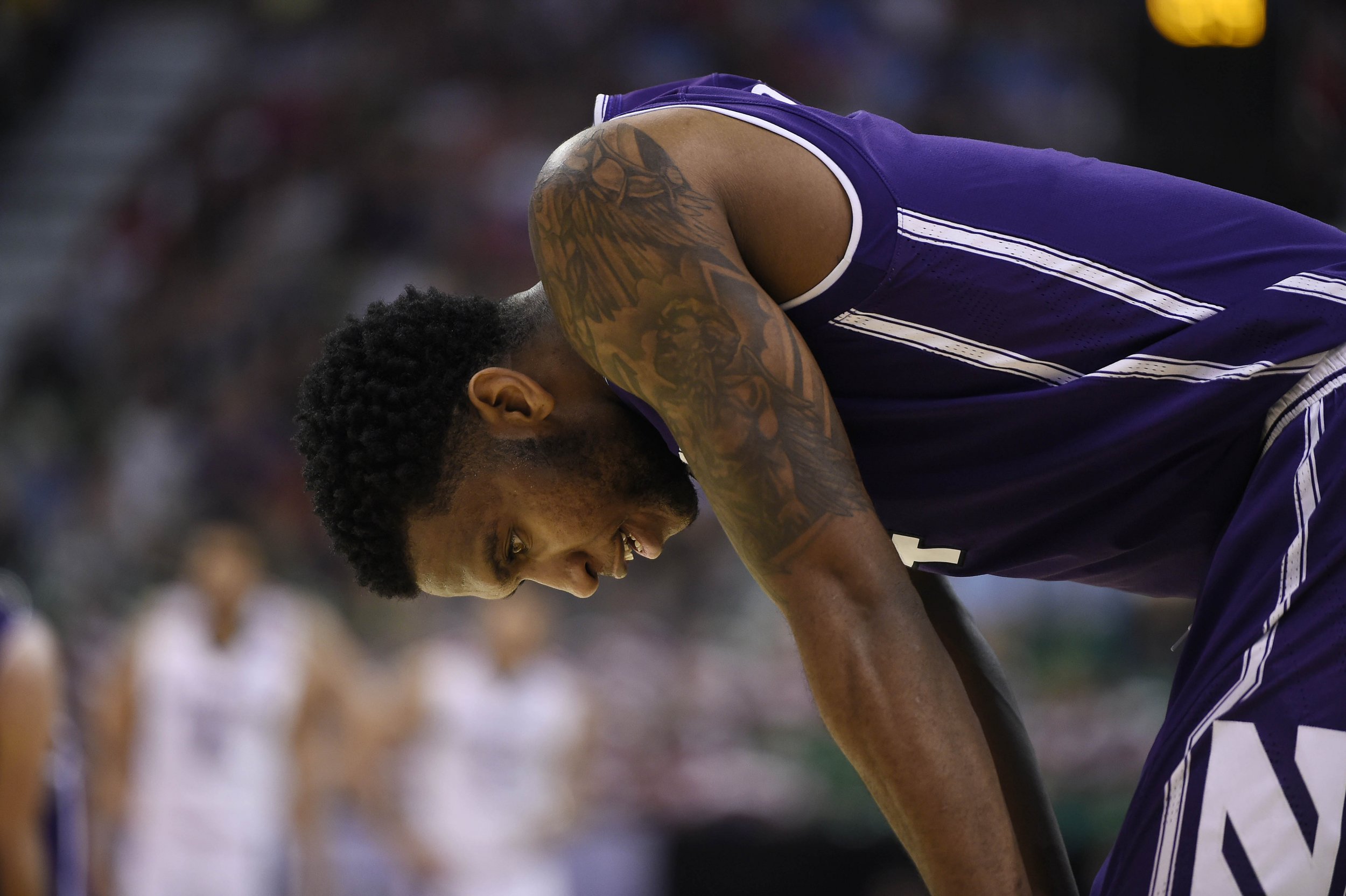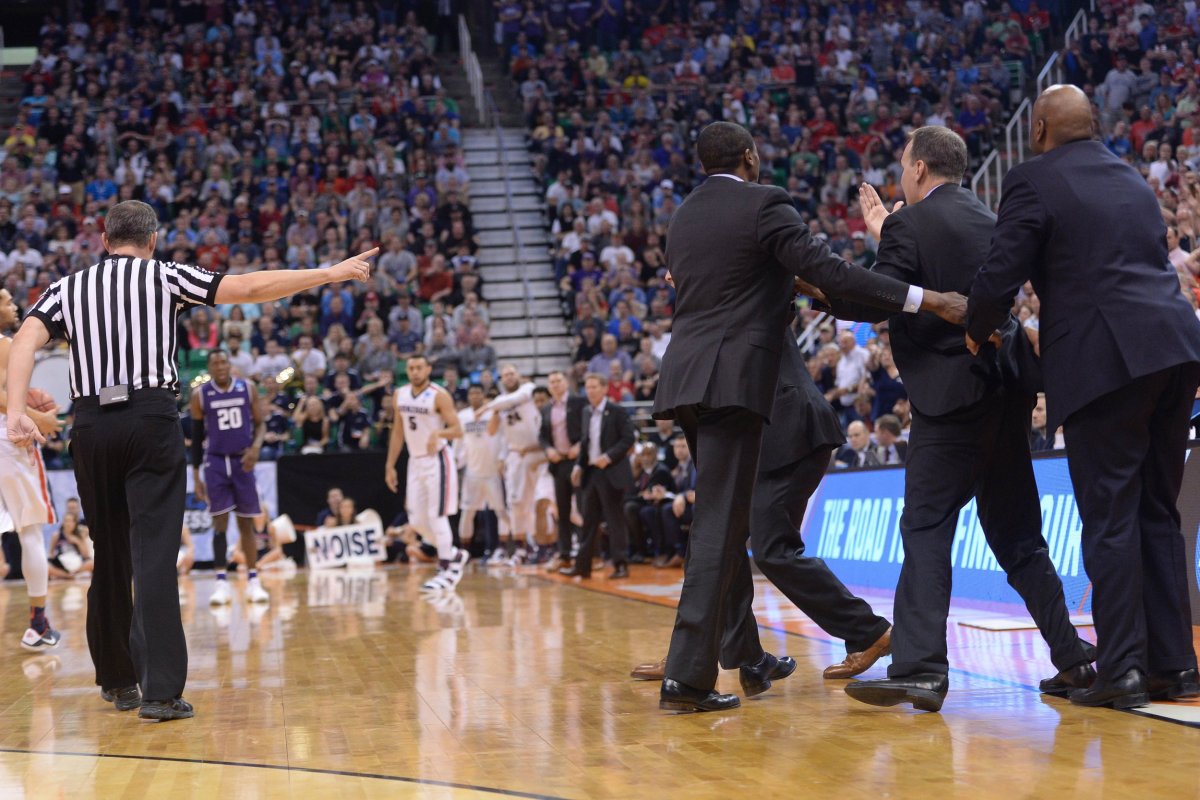
The most memorable and compelling figure from the first weekend of the NCAA basketball tournament was not a Hall of Fame coach or a future NBA lottery pick or even Charles Barkley in his orange feedbag hoodie. It was a distraught boy clad in purple, presumably on the threshold of puberty.
A player or two may have courted fame (Purdue's Caleb Swanigan) or infamy (Vanderbilt's Matthew Fisher-Davis), but neither of them became a meme. The only person to achieve such status was Northwestern Kid, who despite being unidentifiable by name achieved a level of celebrity that most of that university's prestigious drama school alums will never know. Northwestern Kid, at least for the second half of the Wildcats' second-round contest versus Gonzaga, even upstaged team mom and alumna Julia Louis-Dreyfus as the most visible fan in Northwestern's cheering section.
Why did America, and CBS's cameras, become so instantly infatuated with this braces-wearing, blubbering boy? He is far from the first fan to bemoan a lousy call or lose his shit, especially during March Madness. I'd like to think that Northwestern Kid represents not passionate fandom, but rather a loss of innocence, and that is why he has struck a universal chord.
It begins with a sense of fair play. The Constitution guarantees us the right to "life, liberty and the pursuit of happiness," but it sagely never waded into the morass of fairness. To be a child is to believe in an inviolable set of rules and principles, for example that your birthday is a really big deal that should probably be the top story on the evening news. Growing up involves a succession of disillusionments ("What's that you say about Santa Claus?"), all of which lead to an inescapable dictum: "Life isn't fair."
That is a painful road to travel, but one upon which most adults, particularly those who don't have nepotism as a fall-back plan, have trod. Remember that television show, Kids Say The Darndest Things? One of the darndest things you hear children say all the time is, "It isn't fair." How often do you hear an adult utter those words? We shed our innocence as we do our first set of teeth, and there's no avoiding that stage of development. Remember, the host of Kids Say The Darndest Things was Bill Cosby.
We met Northwestern Kid midway through the second half of Northwestern's second-round game versus top-seeded Gonzaga. The Wildcats had trailed by as much as 20 points early in the second half but had clawed back, as feline-nicknamed teams are wont to do, within 11. With 7:36 remaining a flagrant foul was whistled against Northwestern's Barret Benson as he committed a turnover, resulting in two free throws for Gonzaga.
I hope we all find something we love as much as this kid loves Northwestern basketball. pic.twitter.com/QrB9P6wru6
— SB Nation (@SBNation) March 18, 2017
That the Zags would miss both free throws was inconsequential to the unfolding drama. An alert CBS cameraman had found an apoplectic—"crestfallen" does not begin to describe him—young Northwestern fan clad in a purple No. 4 jersey who had just gone Mount Etna. Northwestern Kid's mouth was so widely agape that viewers could see the orthodontic rubber bands inside. We could lip-read him crying, "Why!?!" and "That's SO bad!" and all of us could empathize.
A few minutes later, with 4:57 to play, Northwestern trailed 73-68 when the Wildcats' Derek Pardon attempted a dunk. His shot was exquisitely blocked ("Pardon me!") by Gonzaga's Zach Collins...except that the Bulldogs seven-footer's right hand had come up through the interior of the cylinder to do so. That is goaltending, but the referees missed the call. Northwestern coach Chris Collins promptly took three brisk steps onto the court to apprise a referee of their failure.

Whistle. Technical foul against the Northwestern bench. Inside the CBS production truck someone likely said, "Find that kid again!" Moments later viewers were treated to an encore presentation of Northwestern Kid enduring four of Dr. Elizabeth Kubler-Ross's five stages of grief in the span of a SnapChat video. This was not about a game being stolen; this was about an entire paradigm being crushed. The universe is not fair, and life goes on.
Related: Wolverines clinch number seven seed
Perhaps because I had watched it on television the day before, seeing Northwestern Kid's ire and disbelief reminded me of the final scene from Planet of The Apes. Taylor (Charlton Heston), a.k.a. "Bright Eyes," is riding on horseback along the beach with his mute consort, Nova, at last having escaped his simian captors on this foreign planet. Then he notices the upper half of the Statue of Liberty sprouting from the sand and experiences that excruciating epiphany. "You maniacs!" Taylor cries as he falls to his knees. "You blew it up! Ah, damn you! Damn you all to hell!"
Was Northwestern Kid any less aghast than Taylor had been? Those who have seen both scenes would likely call it a push.
As children we are governed by rules, and so in order to assimilate, and prosper, we follow those rules. Pink Floyd once asked, "How can you have any pudding if you don't eat your meat?" and that is a fair question. However, what type of dystopian world is it where you eat your meat and then don't get your pudding? (These are all First World problems: You get meat? You got to sit how close to Northwestern's bench?)
Rules do not work unless the system is fair, or at least generally deemed so. That expectation extends to sports, of course, which serve as a societal laboratory to condition us, as youngsters, to play fair. Ironically, we are being taught to adhere to the rules while also practicing an overt form of Darwinism, two concepts that are in almost any other forum incompatible.
Northwestern Kid's meltdown (Collins's meltdown, too) happened because in the moment he was unable to reconcile his sense of fair play with referees who seemed oblivious or, worse, apathetic to it. In a moment so fraught with meaning for Northwestern's team and its fans, how could anyone, much less the arbiters of the rules, the referees, be so obtuse? (You will only see adults react this passionately if they have a child in the game or money on it.)
Northwestern Kid is all of us. We were all once that innocent, but most of us are unable to pinpoint the exact moment when the veil of purity was lifted. Very, very few of us have that moment immortalized on video or on social media.
As I watched Northwestern Kid's eyes well up, I thought of another Wildcat supporter seated nearby. He is the father of Northwestern's coach. Forty-seven years ago, in a basketball game with even greater stakes—the 1972 Olympic gold-medal game—he was the best player on a United States squad that was the victim of something far more nefarious.
In the closing seconds versus the USSR, Doug Collins hit the go-ahead free throws after being practically tackled on the way to the basket (that foul would today likely be a Flagrant-2, and at minimum a Flagrant-1, awarding the ball back to Collins's team). What followed was the most controversial ending to a basketball game ever, as officials and the scorekeeper gave the Russians three attempts at a full-court inbounds pass and winning basket. The Russians converted the third attempt and, unlike Saturday's Northwestern game, the mistake appeared to be something worse than a simple momentary lapse of competence.
Doug Collins was the best player on a USA squad that lost to the USSR in the most controversial basketball game in history. In both of Northwestern's game last weekend, its euphoric first-round win versus Vanderbilt and its defeat to Gonzaga, the cameras would occasionally find him. Each time, no matter what the score, Collins wore the same inscrutable, stone-faced visage. That is your future, Northwestern Kid. This is the end of the innocence.
Uncommon Knowledge
Newsweek is committed to challenging conventional wisdom and finding connections in the search for common ground.
Newsweek is committed to challenging conventional wisdom and finding connections in the search for common ground.
About the writer
John Walters is a writer and author, primarily of sports. He worked at Sports Illustrated for 15 years, and also ... Read more
To read how Newsweek uses AI as a newsroom tool, Click here.








